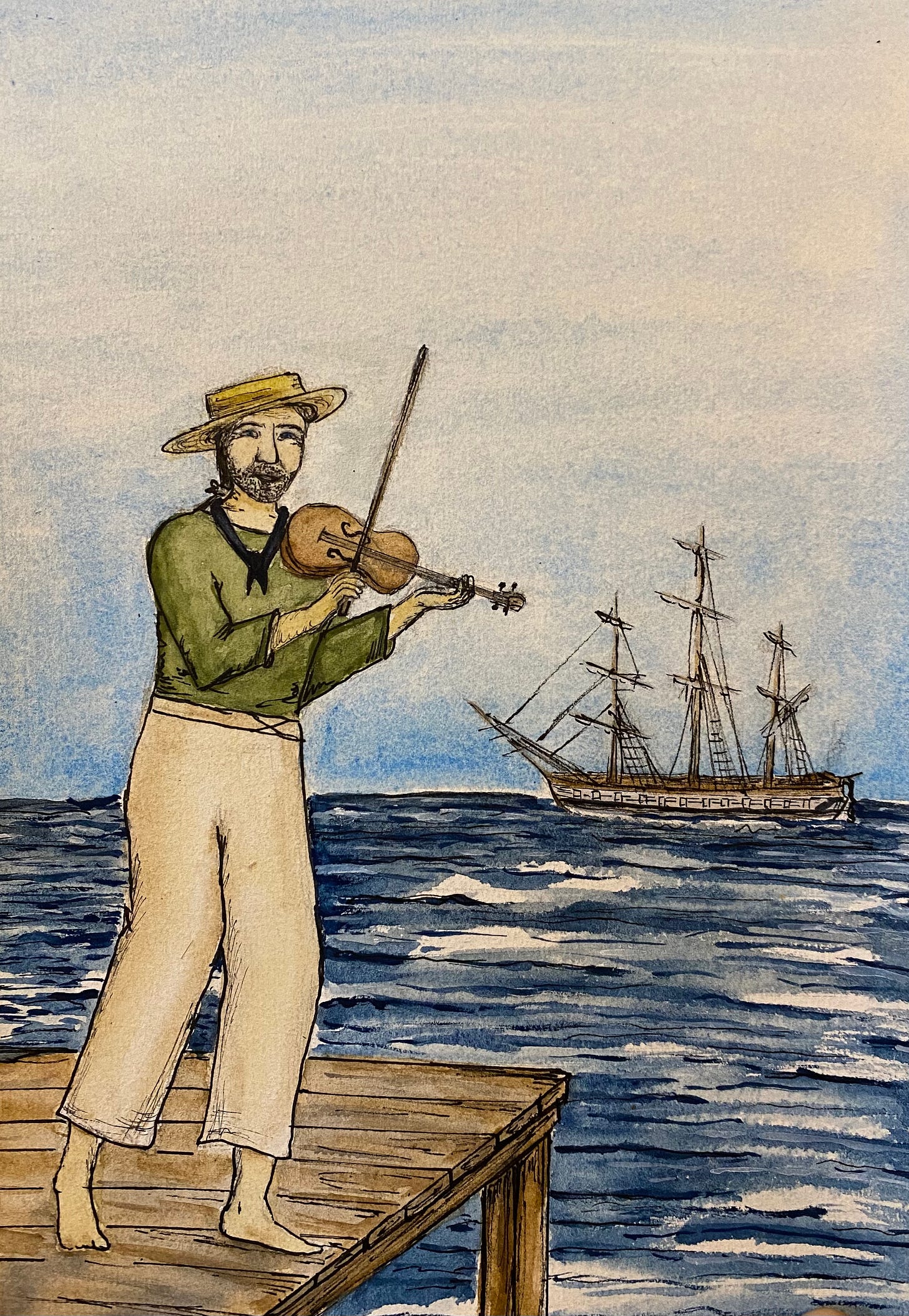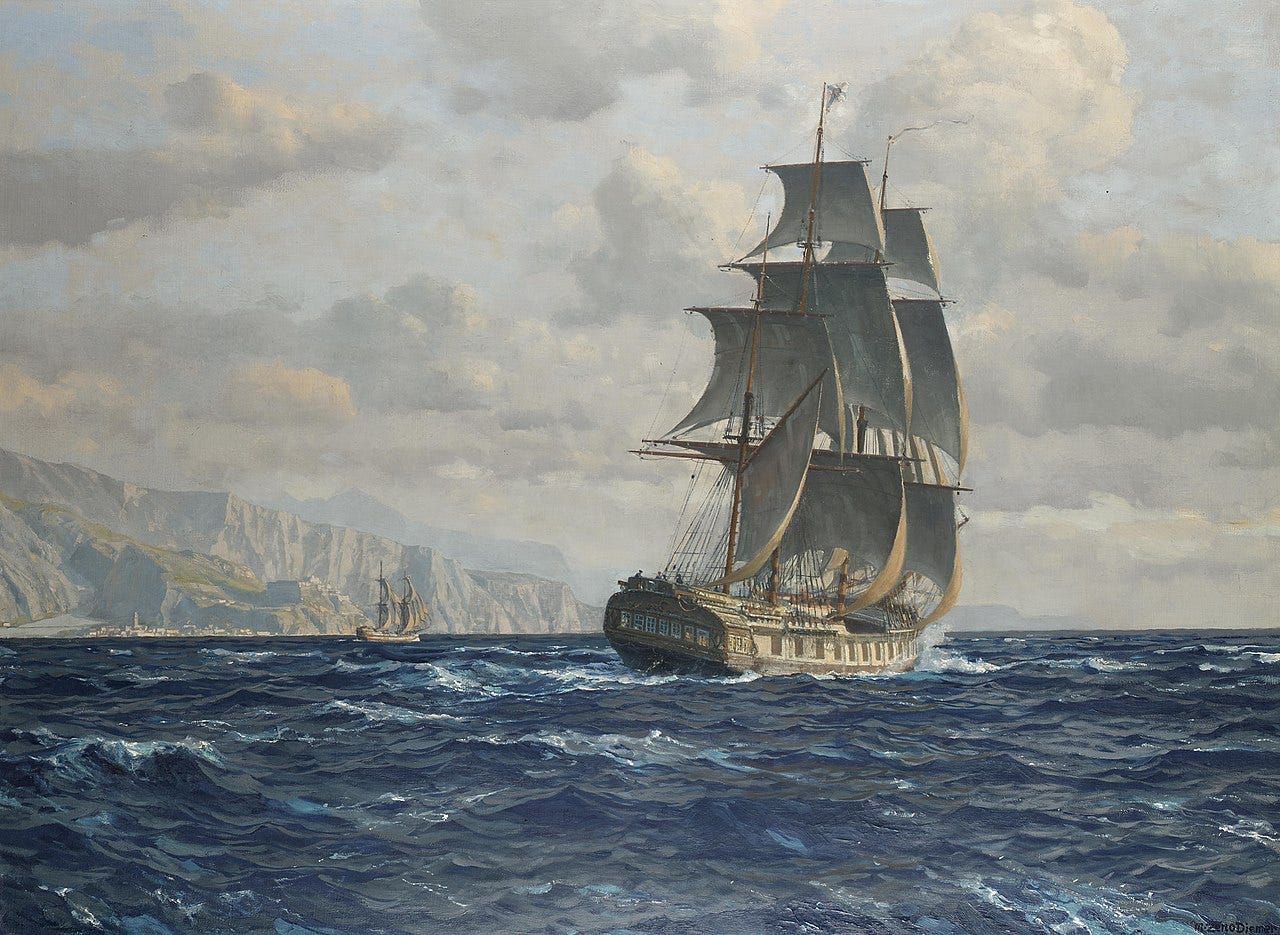I’ll sing you a song of a world gone wrong
when they’ve got no use for a shantyman.
It’s a well-known fact that music has a magic of its own, but few understand the power it holds in connection to the sea. Shantymen knew, and Jack Hudson did better than any.
Of course, there was no such thing as a shantyman in title, only sailors and crewmen with the gift of song, some more, some less, and a few who couldn’t carry a tune to save their lives. Jack Hudson could haul line or reef a sail as well as any, but the time came when he was valued for his song over his vigor. By the time he’d been an able-bodied sailor for enough years that he started to get passed up for younger hands, he’d gained a reputation among the merchant fleet of Britain and her colonies as the shantyman. Many a sailor would have been relieved to sign on to a ship and find Jack Hudson as one of his shipmates. Few first mates would turn him away for fear of bringing misfortune on the voyage ahead.
Sailors of every kind are a superstitious lot. Aboard ships of the British merchant fleet, that worked out to Jack’s advantage. But there were many other ships on the sea and not all of their crews looked so kindly on the shantyman. That’s why Jack Hudson waited patiently in Nassau harbor for a worthy ship and a keen crew.
One such crew prepared to leave Nassau, as evidenced by the general scurrying, not only in the harbor but in all the shops and streets nearby. The shantyman sat in the hot sun near the docks, fiddling The Ship’s Cook while two young boys danced along. They’d have no money to spend in Nassau and dancing was infinitely better than thinking about the difficult voyage ahead.
This is a small taste of the power that lies in the vocal cords and nimble fingers of a shantyman. The boys had sailed across the Atlantic. They knew the hardships of life at sea. Yet, ahead of a voyage through the world’s most notorious waters, there they were, arms crossed, feet kicking out in front of them and laughing as they tipped this way and that.
The first mate of the Dawnswyr, Mr. Weaver stood at a distance watching Jack. Clement Weaver was young for a first mate, perhaps in his thirties. His hair was dark and his skin swarthy which made his green eyes shine out over his high cheekbones. He had a strong chin that he kept clean-shaven.
Clement watched the shantyman interact with the boys. He’d heard of the shantyman and wanted to observe unnoticed for a moment. For a man of the sea, Mr. Weaver was less superstitious than most, so he had no intention of hiring or not hiring any man for the sake of luck. He was wise enough, however, to know the uplifting value of song during a dog watch or while turning a pump. His crew needed a music man and Jack Hudson was the man Captain Morris wanted.
The Ship’s Cook ended and the shantyman chose another. Apparently, the boys weren’t familiar with the steps because Jack gave instructions over his lilting melody. It seemed to Clement Weaver that the shantyman forgot that his fingers and vocal cords were both of his own body and under his control. He raised his voice over the violin and then his bow intensified to match. He grew louder by degrees until he was yelling in an attempt to be heard over his own violin.
Passers-by gathered, most staring at the spectacle of yelling shantyman and dancing ship’s boys, some sneering at them. Of the latter, most were older sailors who had forgotten what it was to be a boy at sea for the first time. Or maybe the difficulties of life before the mast had worn away their ability to enjoy this kind of glee ashore. Perhaps they were envious of the innocent joys of boyhood.
Yes, the first mate decided. This shantyman would do perfectly for their mission. When he sensed the reel coming to an end, Clement Weaver strode over to the shantyman.
“Know your way around riggings as well as those strings?”
“Aye.”
“You must be looking for a ship then, sitting here in Nassau harbor.”
“I’m looking for the right ship.”
At this answer, Mr. Weaver looked down his nose and examined Jack Hudson more closely. A man couldn't become second in command of a ship such as the Dawnswyr without the ability to read a man’s face. Clement Weaver saw no malice in Jack, though perhaps a little more cheek than he liked. There was more evidence of laughter than anger in the lines around Jack’s eyes and within them was a goodness that made Mr. Weaver all the more eager to hire him. But he wouldn’t let Jack know that.
With his graying stubble and thinning form, Jack Hudson looked older than he was. Tan and leathered skin supported his claim of seamanship. Silver strands mingled in the ash-brown hair tied beneath his tarpaulin hat. Though Jack was obviously a decade or two older than him, Weaver wouldn’t have called him old, perhaps seasoned.
“The Dawnswyr makes ready. Report to my quartermaster, Mr. Briggs, if you want a berth.”
Weaver went on his way without a doubt that Jack would sign on. He assumed any sailor wanting pay would be happy to find a ship, much less a shiny new frigate such as the Dawnswyr. In those days, there were many more sailors than ships to hold them. He didn’t know that Jack Hudson wasn’t just any sailor. He was a wise and weathered seaman who knew better than to jump into the first hammock that came to port.
When the Dawnswyr arrived in Nassau, Jack had already heard of her. Once the crew debarked, it wasn’t hard to find out that the ship was sound and the captain fair. Rumors about her next commission gave him pause, but life at sea was always risky. Jack had been around the horn before; that didn’t scare him. His bones would probably lie in the ocean someday. What did it matter where? The rumors regarding Captain Morris’ business in the Pacific on the other hand, concerned Jack. But he’d weighed his chances of getting a better situation and decided ahead of time that if an offer for the Dawnswyr came his way, he’d take it.
When Jack came aboard, Briggs had him make his mark on Captain Morris’s articles for running the ship. Jack glazed over the usual guidelines for behavior, pay, punishment etc, etc.
The quartermaster, Mr. Briggs, was a less discerning man than the first mate. He had a round middle, an upturned nose and pinched lips. Altogether, this gave the impression of a pig in a sailor’s jacket. As a rule, he treated all hands like they’d mutineer at the first sign of weakness. Unable to discern between the willful and the hard-working, every order was given in a harsh bark.
“Don’t see why we’s hirin’ new hands halfaways there.” He grumbled at Jack as he led him below. “And one with more duffles than a woman.”
“You don’t want a shantyman without a fiddle now do you?”
“So, your’s a music man are you?”
“Aye, and an able-bodied sailor.”
“Sure y’are.” The quartermaster didn’t keep the doubt from his face as he eyed the shantyman's thin frame and graying hair. “Well, we’ll be needin’ you shortly when we haul anchor. So bring it with you when all hands er called.”
“Aye aye, sir.”
It doesn’t take any time to plunk down a sea chest and hang a hammock, which suited Jack just fine. He ran a bow across his fiddle strings and tuned it by ear. A quartermaster, no matter how gruff, who called for a tune to haul anchor lessened the reservations Hudson had about the ship’s business in the Pacific. At least music would be welcome.
The whistle sounded, calling all hands. Mr. Briggs hollered at him to stand with Mr. Rhys’s men, just after the main mast on the starboard side.
“Pipe the side,” The quartermaster told the bosun.
The bosun trilled his whistle, the hands stiffened and Captain Morris appeared over the side of the ship. Though the ceremony lacked the precision and official pronouncements of a Navy Captain embarking, it upheld the honor due to a merchant captain. There were no whispers or scufflings from the men. Everyone was in order.
Jack cocked an eye at the Captain when he could do so without reproach. He’d heard Captain Morris was fair, though tough on sailors and especially those new to his crew. He had gray, discerning eyes in a full face. In contrast to Mr. Briggs’ corpulent roundness, Captain Morris looked well-fed yet strong. He seemed well-groomed, with brassy brown hair neatly tied back under his tricorn hat.
As a seasoned sailor, Jack vastly preferred a harsh captain over a light-handed one. A hard captain could be counted on to be tough on his men and run a tight ship. A Captain afraid of such a reputation was unpredictable. One moment he would bark orders, for this was necessary to run a ship, and the next he would turn a blind eye to undisciplined sailors and order extra spirits in an attempt to win the respect of the crew. In fact, those methods accomplished the opposite.
Any fool could smell a captain with a weak spine from a mile away. Rich second sons who couldn’t hack it in the navy would take charge of any merchant ship available to make a name for themselves at sea. Even a title couldn’t save such a man from foolhardy sailors with a hunger for power and no qualms about sending a captain on his way in a dinghy.
No, Jack wouldn’t take two steps aboard a ship with such a captain. The question was not whether Captain Morris was strong or fair, but whether he was good. For there is quite a difference.
And then the moment was over. Whistles and shouts set the crew into motion. The crewmembers who belonged below deck scurried there. The men of the watch went to their places, perhaps with more stately determination for the event of hauling anchor. The mates shouted as only sailors could; the men bustled to follow orders.
“You can prove your mettle later. Now, all I want from you is a long haul!” The quartermaster told Jack.
“Aye, sir.” Jack already has his fiddle up.
If Jack had a tense curiosity to know more about the captain and crew, the crew listened with equal anticipation to hear the shantyman. Beyond the required instructions the sailors barked to one another, no one chatted or even jeered at the next man for slowness. A moment before his bow hit the strings, the first mate relayed the captain's order.
“Weigh anchor, Haul away, boys!”
“Man the capstan! Haul, boys!” Repeated the quartermaster.
The note rang loud and true and before the men even knew the tune, their bodies responded to the hypnotism of the long-haul shanty. Not too slow, nor too fast the melody of Sally Brown danced across the deck and through the shrouds. It was a safe choice, especially pulling away from a port where many of the men would have visited their beloved Sally Browns. Jack gave them a good start of accompaniment and then started singing.
Seven long years I courted Sally,
And on cue, though with some reservation, most of the men joined in the refrain.
Way, hey! Roll and go!
Seamlessly, the shantyman continued, But all she did was dilly-dally,
And all together again, a little louder, Way, Hey! Sally Brown.
By the end of sixteen verses, everyone on the ship knew two things. First, Jack Hudson was just the kind of musical wizard the ship needed to enchant its sailors into the rhythmic motion of a smooth-running ship. Many an experienced man aboard would have excused Jack if he hadn’t been able-bodied knowing that a good shantyman was worth his rations and berth.
Second, it hadn’t gone unnoticed by anyone except the youngest ship’s boys that Jack had skipped the coarsest couple of verses. A couple looked at this with respect, a few with mockery, and many with simple curiosity. What kind of man was Jack Hudson?
Jack was aware of some of the thoughts his crewmates had towards him on that busy first watch of the voyage. He was unaware, however, of the palpable change of atmosphere he’d brought onto the ship with him.
Next, the quartermaster demanded a series of short-haul shanties as the captain requested the sails be modified more than a few times as they found a fair wind. Every man kept a weather eye out for sails drawing near. And it was as if the Dawnswyr herself breathed a sigh of relief when land faded and with it the chance of encountering unfriendly ships.
Jack set his fiddle down to rest his fingers and prepare a line for a halyard repair in the royals. The air tingled with excitement about the voyage ahead. The Pacific. Even the “old” shantyman shifted at the possibilities of another trek into that wild and untamed corner of the world.
Captain Morris nodded at Mr. Weaver, a silent approval of his recruiting Jack Hudson in Nassau. The wind blew fair, almost staving off the tropical heat of the West Indies and several prayers went up that it would continue across the doldrums.
There were no better circumstances in which to begin an adventure. Jack found himself thinking that if beginnings signified how the rest of the journey would go, he’d have a pleasant adventure ahead of him indeed.
If only.






💗💗💗